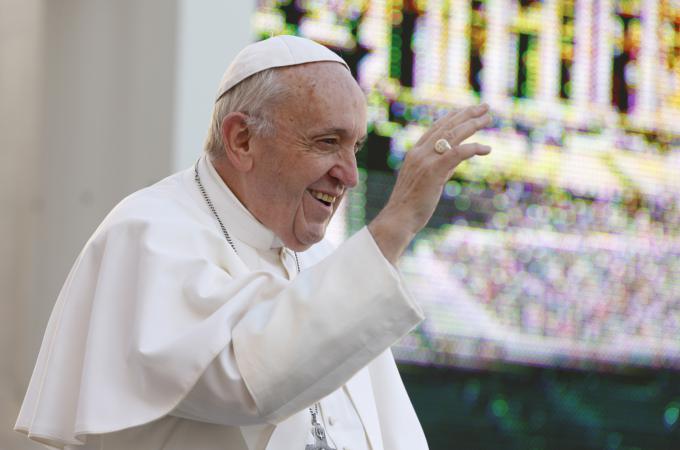On loving the Holy Father
March 13 marked the 5th anniversary of Pope Francis' election as Bishop of Rome, successor of Peter and head of the universal Church. As always with public figures, there is no lack of media commentary on his papacy, and in his case it's been mostly positive but with a recently growing undertow of negativity. What are we to make of this?
Pope Francis has a knack for the edifying dramatic gesture, like carrying his own suitcase or paying his hotel bill the day after his election, or living in Santa Marta's residence rather than in the Apostolic Palace. Of course, this pope, like any pope, is human. And so he can make mistakes -- mistakes about personnel, mistakes about political matters, mistakes in prudential judgment. As Catholics, we believe that he cannot err in teaching faith and morals, but only when he speaks formally ex cathedra, as supreme teacher of the Church.
For Jesus solemnly proclaimed to Peter and his successors in the papacy, "You are Peter, and upon this rock I will build my Church. And the gates of hell will not prevail against it. I will give you the keys of the kingdom of heaven. Whatever you bind on earth shall be bound in heaven; whatever you loose on earth shall be loosed in heaven." (Matt 16:18-19). Following the pope and his authority are what defines us as Catholics. Which is why St. Catherine of Siena referred to the pope as the "sweet Christ on earth."
Pope Francis (Jorge Mario Bergoglio) is an Argentinian and a Jesuit, which are identities most of us do not share, though hopefully we can appreciate their good qualities. To his credit, virtually whenever Pope Francis makes a public appearance, starting the evening of his election, he asks people for prayers. His job is, humanly speaking, an impossible one, and so he is in particular need of God's constant help. As good sons and daughters of the pope, we should pray for him that God keep him and strengthen him and make him holy. For he is the first to acknowledge that, like all of us, he is a sinner in need of God's grace and forgiveness. When he recently heard confessions in St. Peter's Basilica, he began by going to confession himself.
One of the great features of this pontificate is Pope Francis' emphasis on God's tender mercy and forgiveness. He is constantly repeating that God is a loving Father who forgives all who turn to him. When we ask God for forgiveness in the "Our Father," we ask to be forgiven as we forgive those who trespass against us. If this duty of forgiving extends to everyone who offends us, it should extend particularly to those closest to us in the order of charity: our family, friends, sharers in the household of faith -- and the Holy Father himself if needs be.
In some ways we have been spoiled by the popes of my lifetime. Every one, without exception, has been exemplary and virtuous. Several have been canonized or shortly will be: St. John Paul II, St. John XXIII, and Blessed Paul VI; others are well on the road to canonization: Venerable Pius XII and Venerable John Paul I; the other two are still alive, Pope Emeritus Benedict XVI and Pope Francis himself. This does not mean that they never made mistakes, of course. But their rectitude and holiness were and are palpable.
Pope Paul VI will be canonized this year, the 50th anniversary of his famous encyclical Humanae Vitae clearly defending the Church's teaching on artificial birth control. While many rashly criticized him at the time, it turns out that Blessed Paul VI was heroic and prophetic in denouncing the contraceptive mentality and the train of evils that would ensue with the acceptance of the sexual revolution then at its peak.
Contrast this with the 15th and 16th Centuries, when a number of venal and worldly men occupied the See of Rome. Think, for example, of Alexander VI, the Borgia Pope, or Leo X, the Medici Pope at the time of Luther. Such men did not destroy the Church, of course; but they caused much scandal. Nor were they heretics. However badly they lived, they did not teach formal error. Even then, loyal Catholics obeyed the Bishop of Rome.
And so we can and should loyally thank God for Pope Francis' stewardship of the Catholic Church, praying for him and trying to follow his lead when it comes to forgiveness, mercy and reaching out to people on the margins. As the Code of Canon Law says in canon 1404, "The First See is judged by no one." Or to put it differently, only God can judge him authoritatively. In the meantime, he's our pope and Holy Father.
- Dwight G. Duncan is professor at UMass School of Law Dartmouth. He holds degrees in both civil and canon law.



















